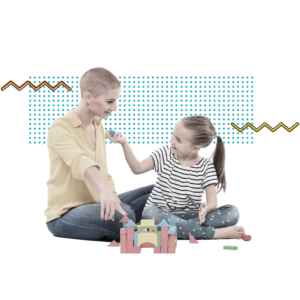Robyn’s Recommendations: 4 concrete resources for Social Workers assisting children who have experienced trauma
 We’ve been big fans of Robyn Gobbel, LCSW RPT-S, for a long time. In 2017, she was the keynote speaker at our annual UT Child Welfare Conference, where she gave a powerful presentation on resilience through relationships. Robyn has 15+ years of experience working as a complex-trauma therapist, specializing in adoptive families. When we were thinking about who might have a strong pulse on how to help the helpers right now, we instantly thought of her.
We’ve been big fans of Robyn Gobbel, LCSW RPT-S, for a long time. In 2017, she was the keynote speaker at our annual UT Child Welfare Conference, where she gave a powerful presentation on resilience through relationships. Robyn has 15+ years of experience working as a complex-trauma therapist, specializing in adoptive families. When we were thinking about who might have a strong pulse on how to help the helpers right now, we instantly thought of her.
In early May, Robyn wrote an important blog post called “I’m worried about the therapists…and the invisible front line,” which received a wide amount of praise from people in the field experiencing exactly the concerns she illustrates. We reached out to Robyn to see what resources she’s found to be most helpful for therapists in the time of Coronavirus, and she immediately responded with the following four recommendations, along with some context for why they’re her favorites:
—
- In early April, Melanie Sage, PhD, LCSW published a short article on LinkedIn called “A Love Letter to Social Workers on the Invisible Front Line of COVID19.” She shares stories from social workers working in different settings that gave these invisible frontline workers around the country (and world) a few moments of being genuinely seen. She spoke to our hearts, reminding us that we don’t need people to fix unfixable situations; we need to be seen and known.
- Host of Trauma Therapist Podcast Guy McPherson quickly went to work on creating a “Managing in the Midst of COVID19” series, starting with Dr. Bruce Perry and continuing with leaders in the trauma therapy field, including Peter Levine, Janine Fisher, Pat Ogden, and more. Guy has a heart for supporting new trauma workers and his entire podcast is amazing, but this series focused on being a helper during a pandemic helps those of us on the invisible frontline feel connected to each other while offering some practical tips.
- While not specific to the COVID19 pandemic, BK Publishers is offering a free PDF download of the essential book “Trauma Stewardship: An Everyday Guide to Caring for Self while Caring for Others.” Trauma Stewardship really is a must-read for all helpers, healers, and educators who care for people impacted by trauma. Unmetabolized trauma is likely related to burn-out, which increases our risk for physical and mental health problems, blurring of boundaries, loss of compassion, and loss of self-awareness. Social Workers are held to a high standard of understanding and connection with their implicit biases related to marginalized and oppressed populations; it’s crucial we care for ourselves and process the trauma of working with people experiencing trauma- for ourselves and our clients.
- For practical tips on how to connect with children and families in a telehealth platform, many therapists and social workers I work with have found this Facebook community to be supportive and overflowing with practical resources and tips. Be sure to vet the resources thoroughly and with discernment!
—
If you’re looking for more of Robyn’s work, we highly recommend her recent webinar called “Playfulness IS the Therapy.” Co-presented with Bonnie Badenoch for the Global Association of Interpersonal Neurobiology Studies, this webinar explores the benefits of play for our physical and mental health. Furthermore, Robyn and Bonnie discuss how to cultivate a spirit of playfulness with clients, whether in person or virtually. It’s currently available for free on the GAINS website. Attendees reported feeling seen, validated, inspired, and reminded that they are “doing enough.”
Thank you, Robyn, for sharing your resources with us!
